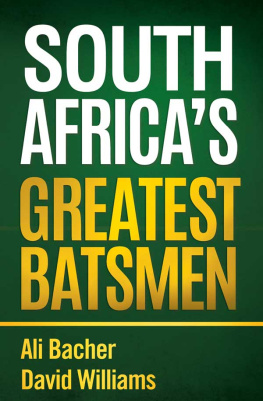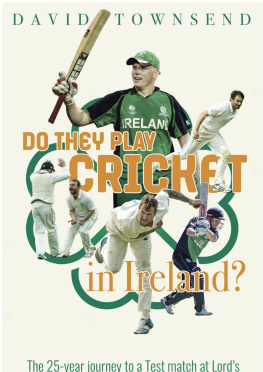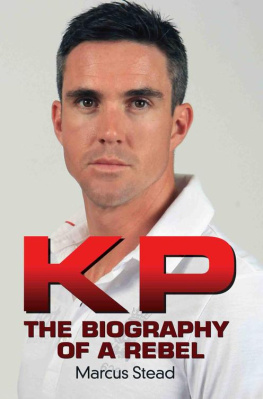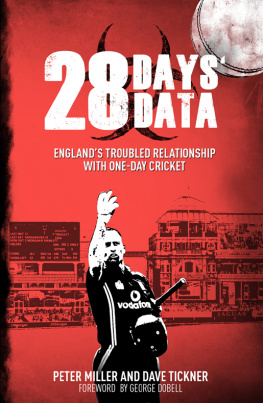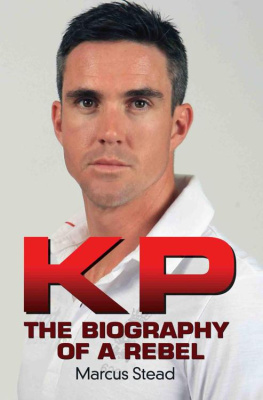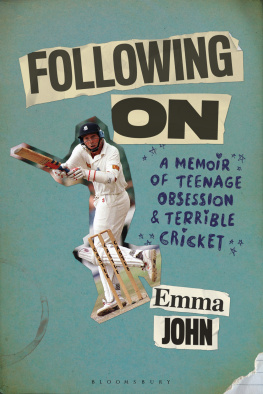
Also by Simon Wilde
Ian Botham: The Power and the Glory
First published in Great Britain by Simon & Schuster UK Ltd, 2014
A CBS COMPANY
Copyright 2014 by Simon Wilde
This book is copyright under the Berne Convention.
No reproduction without permission.
All rights reserved.
The right of Simon Wilde to be identified as the author of this work has been asserted by him in accordance with sections 77 and 78 of the Copyright, Designs and Patents Act, 1988.
Simon & Schuster UK Ltd
1st Floor
222 Grays Inn Road
London WC1X 8HB
www.simonandschuster.co.uk
Simon & Schuster Australia, Sydney
Simon & Schuster India, New Delhi
Every reasonable effort has been made to contact copyright holders of material reproduced in this book. If any have inadvertently been overlooked, the publishers would be glad to hear from them and make good in future editions any errors or omissions brought to their attention.
All photographs in the book Getty Images
A CIP catalogue record for this book is available from the British Library
Hardback ISBN: 978-1-47113-818-8
Trade paperback ISBN: 978-1-47113-914-7
Ebook ISBN: 978-1-47113-820-1
Typeset in the UK by M Rules
Printed and bound by CPI Group (UK) Ltd, Croydon, CR0 4YY
THE CIRCLE OF LIFE
In effect, South African cricket threw me out. Under the quota system, every state side had to include four players of colour. Three years ago, they [Natal] signed a coloured player who, like me, bowled spin. I knew that Natal would not play two spinners, so the coloured player would always have an advantage, regardless of ability. I firmly believe teams should be selected on merit alone and I was faced with a situation where my opportunities would be limited for other reasons.
Kevin Pietersen, quoted in the Independent, 21 July 2003
The England team needs to rebuild after the whitewash in Australia. To do that we must invest in our captain Alastair Cook and we must support him in creating a culture in which we can be confident he will have the full support of all players, with everyone pulling in the same direction and able to trust each other. It is for those reasons that we have decided to move on without Kevin Pietersen.
ECB statement on the sacking of Kevin Pietersen, 9 February 2014
INTRODUCTION
FOR ANYONE whose job it was to report on the England cricket team, Kevin Pietersen was the gift that just kept on giving. He rarely did anything that was dull. He played some of the greatest innings seen by a man in an England shirt and even when he was struggling, as occasionally happened, he did it in interesting ways. Who would have thought he could have got into such a tangle against run-of-the-mill left-arm spinners? But it was not just what happened on the field that was eventful: he had a habit, which he never quite kicked, of saying, doing (or even once whistling) the wrong thing. As Michael Vaughan once observed, his lips did not work quite as well as his bat. Of course, this only added to the fun of the journalistic fair.
Pietersen himself saw it rather differently: he soon wearied of the trouble, much of which he felt was unwarranted and due to media mischief. In his last couple of years as an England player, he had as little to do with us in the press box as he could. He preferred to speak with allies in radio or television. He blocked us on Twitter. In return, he was held by some in little affection.
Once the 2013-14 tour of Australia started to go badly, it seemed more likely that Pietersen and England would go their separate ways: either he would walk off into a Twenty20-tinted sunset or Andy Flower would make the case for rebuilding the team without him. When the axing came, though, it was still a depressing moment. Those of us who have spent years watching cricket for a living are pretty hard to impress, but there are a few players who demand attention and Pietersen was certainly one, along with Brian Lara, Shane Warne and Sachin Tendulkar (if only because you knew one billion others were watching him as well).
Perhaps England were right on all counts; maybe he was too much trouble and maybe there were no more great innings left in him. Maybe from his point of view, being sacked was a good career move on the basis that it left people wanting more. But England should be grateful for the good times: the Pietersen era brought them much success and but for him a lot of it would not have happened. Its going to be dull without him.
1
PIETERSEN AND IDENTITY
THE MYERS-BRIGGS Type Indicator is not something you hear much about in sporting circles, but in the increasingly scientific world of professional cricket it is one of many measures the English game has used to profile elite athletes. In essence, it is a means of psychological profiling, or a personality test, and is commonly used in business, the armed services and government to help workers define their roles and develop team-work. In a team sport the aim is the same: to work out how divergent personalities might best blend into a smooth-running unit. Based on the theories of the Swiss psychiatrist Carl Jung, the test typically requires the respondent to answer more than 80 questions posing one of two possible answers. Based on their responses, four elements of their personality are determined extraversion/introversion, sensing/intuition, thinking/feeling and judging/perception and they are allocated one of 16 four-letter types.
So complex and contradictory is his character that psychologically profiling Kevin Pietersen might be something a lot of us might be keen to do. What on earth would the Myers-Briggs test tell us? Well, we dont need to speculate too much because Pietersen let slip some of its findings during one of the more revealing interviews he gave.
Pietersens exchanges with the media could be frustrating affairs. Sometimes he just didnt want to be there and offered nothing. At other times, generally when there was a TV camera present and there was an element of live performance, he could be forthcoming and entertaining. In the build-up to the Ashes series in England in 2013, he agreed to an interview with BBC Radio; no doubt it helped that the man conducting the interview was a former team-mate, Andrew Flintoff, even if he and Flintoff had not always been bosom-buddies in the dressing-room because of their comparable superstar status. There was still an edginess, but with with Flintoff safely in retirement, Pietersen saw a kindred spirit; a man who knew something of what he went through in his daily existence. In these circumstances, he trusted Flintoff and trust or the absence of it was always a good starting point when it came to Pietersen and relationships.
Asked how he had felt when he first joined the England dressing-room as a one-day player in the winter of 2004-05, Pietersen replied: I was scared... Coming into any environment I think anybodys scared, anybodys nervous. I was certainly scared. He added: Im still scared... even in circumstances that Im not comfortable now. Ive got this reputation of being confident and stuff, yet you go and do all these psychology tests, all these Myers-Briggs tests, and Im an introvert. Im very much an introverted person. I like my own company, I like my own family. I dont really go out... The confidence has grown from what Ive achieved on the cricket field, but Im not as confident as anybody thinks.


